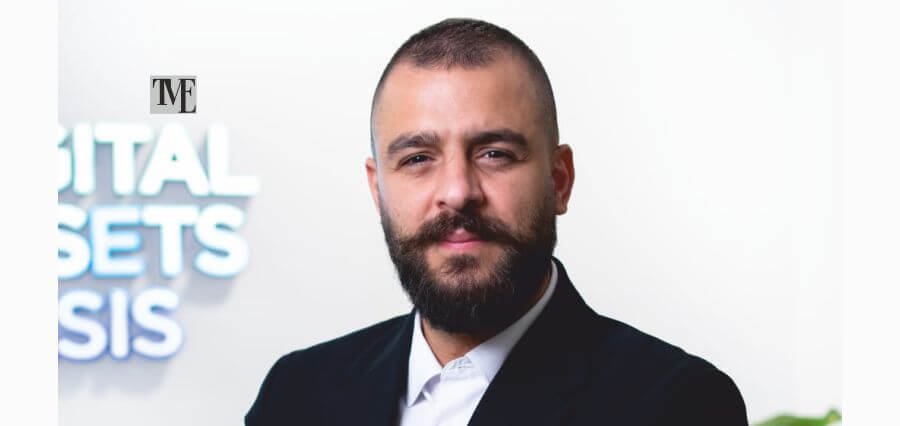Financial and technological visionary leadership demands more than strategic capacities; it entails the capability of translating the idea into practical outcomes. The best leaders can improve business performance in the direction of growth and innovation, challenging the market and engaging with high-performance teams within a rapid environment.
Nabil Arnous, RAK Digital Assets Oasis Executive Director, is such a figure, an enactment of both vision and action. Having worked in the Free Zones, Government, and Hospitality industries with a strong track record and expertise, he has established himself as a performance-oriented executive with an ability to nurture a revenue boost and expand business by piecing together game-changing commercial thought.
In his new role as chief executive officer of RAK Digital Assets Oasis, he has managed to drive the organization to exceed its annual budgeted revenue during the year of its full functioning. He has a firm grasp of P&L management, financial forecasting, and budgeting, and has achieved profit maximization in various operations.
Nabil is more than a financially oriented leader. He is creating and leading a high-performance department with over 100 professionals, leading a culture of excellence in sales, marketing, and operations. His experience in digital sales transformation has led to the incredible 5.5-fold increase in lead generation, strengthening its market penetration and competitiveness.
The pivot of his strategy is strategic alliances. Negotiating and maintaining essential global partnerships, he can close such high-profile deals that provide long-term revenue acceleration and market relevancy. His visionary drive still makes RAK Digital Assets Oasis a dominant player on the emerging digital assets horizon.
A strong believer in transforming businesses and creating sustained growth through innovation and leadership excellence, he is always open to taking on high-impact leadership roles as an executive.
Designing the Future of Finance
Nabil’s journey into finance and banking technology began with a simple yet enduring fascination: how systems move value and create trust at scale. As a student of both business and technology, he was captivated early on by the convergence of financial infrastructure and emerging digital tools. He began his career in the traditional banking sector, where he quickly identified the growing gap between legacy systems and the evolving expectations of digital-native clients.
Over the years, Nabil transitioned from executing on operational efficiency to driving strategic transformation. He mentions, “My passion matured from understanding how systems work to imagining how they could work better.” The move into leadership came organically, not from a pursuit of authority, but from a desire to create meaningful impact. Today, at RAK DAO, he leads with a clear conviction: the next era of finance and technology is not only digital, but decentralized, inclusive, and borderless.
The Principles Behind Visionary Leadership
Visionary leadership today means going beyond reacting to disruption; it is about designing the future with intention. In a space where technology evolves faster than regulation, the challenge is not simply in adopting new tools, but in creating trust in the unfamiliar.
At RAK DAO, Nabil defines visionary leadership through three principles: clarity of purpose, courage amid ambiguity, and collaboration over control. Positioned at the intersection of finance, governance, and decentralization, the organization operates where the stakes are high, and the roadmap is fluid. This demands listening with humility, acting with boldness, and anchoring every innovation in tangible value.
Vision alone is not enough; execution is the differentiator. What separates a visionary from a dreamer is the ability to translate bold concepts into regulatory-compliant, scalable products, such as issuing licenses on-chain or deploying AI-led planning tools that redefine user experience.
Where Innovation Meets Accountability
Technology is not a department; it is a language of leadership. Every strategic decision at RAK DAO is viewed through a lens of scalability, automation, and accessibility. Whether licensing DAOs on-chain, using AI to generate compliant business plans, or leveraging Web3 identity layers, technology informs both the how and the why of the roadmap.
That said, innovation without risk awareness is recklessness. The organization operates under the watchful eye of regulatory bodies, and rightly so. His approach is to innovate with intention: deploy MVPs quickly, validate with data, and then scale responsibly.
How Empathy Turned Risk into Advocacy
During his early months at RAK DAO, Nabil faced a decision about renewing a large client relationship that, on paper, showed poor financial return. Data suggested walking away. However, something in the founder’s tone during their meeting, his fatigue yet lingering hope, indicated this was a case of missed alignment, not lost potential.
Nabil proposed a renewal incentive model that offered tailored discounts to re-engage the client. Not only did the client renew, but they also became one of RAK DAO’s most vocal community advocates, directly influencing several new leads. While data can measure outcomes, empathy reveals possibility.
In leadership, especially when steering emerging technology environments, intuition often serves as the first signal that a deeper layer of strategy or humanity is at play. He has learned to listen to it.
Reimagining Business Enablement at RAK DAO
Nabil is known for his forward-thinking approach, with several transformative initiatives standing out during his time at RAK DAO. He led the launch of the world’s first on-chain licensing model via the RAK DAO Token. This initiative went beyond a technological achievement; it resolved a regulatory bottleneck and positioned RAK DAO as a hub for Web3 builders.
He also spearheaded the creation of an AI-powered business planning portal that made compliance more accessible while simultaneously serving as a powerful lead-generation engine. This tool enabled users to move from “napkin to license” in hours rather than weeks.
Additionally, he restructured partnerships with key brands within the technology industry, turning months of stagnation into tangible co-branded outputs. This effort transformed goodwill into measurable growth.
Each of these projects represented a strategic shift in how a free zone authority operates, evolving from a passive licensor to an active ecosystem enabler.
Where Everyone Owns the Outcome
Nabil believes culture shapes innovation, and fostering a culture of agility, accountability, and collaboration is central to his leadership at RAK DAO. He emphasizes that culture is not just what is encouraged but also what is tolerated. At RAK DAO, a tone of radical ownership is set, where every team member from sales to partnerships understands the underlying “why” behind the mission: enabling the future of decentralized business, both legally and practically.
Agility is cultivated by granting permission to experiment, while accountability stems from clear goals. The teams operate within an OKR-based framework applied with flexibility, empowering members to build, break, learn, and rebuild.
Collaboration thrives on proximity to purpose. The product is tangible, including licenses, technologies, and real companies. When teams see how their contributions directly impact founders, revenue, or community traction, silos naturally dissolve.
Reclaiming Relevance in a Tokenized Economy
Nabil believes the biggest risk for traditional finance is not change itself, but irrelevance caused by inertia.
To remain influential, he asserts that institutions must reframe their role from gatekeepers to enablers. This includes embracing composable finance by offering APIs rather than just products, supporting tokenized assets and decentralized governance, and partnering with regulatory sandboxes and innovation zones.
Furthermore, institutions need to develop cultural fluency in technology. This means not only hiring digital consultants but embedding cross-functional Web3 teams directly into their strategic planning.
According to Nabil, the institutions that will succeed are not necessarily the fastest adopters but the most credible bridges between the regulated world and the decentralized one.
Context, Access, Confidence: The Pillars of True Mentorship
Nabil looks for curiosity, accountability, and adaptability in rising leaders. He believes that while skills can be taught, drive and integrity cannot. The best emerging leaders he has worked with ask “why not?” as often as “how?”
At RAK DAO, he mentors through co-creation rather than delegation. He highlights, “Whether it’s interns building AI tools or junior managers structuring events, I involve them in real decisions and encourage failure as long as it’s intelligent.” For him, mentorship is not about providing answers but about offering context, access, and confidence. He often says, “If you can argue with me, you’re ready to lead without me.”
Creating Frameworks for the Next Era of Innovation
Nabil hopes to be remembered as a leader who gave structure to bold ideas, not just celebrated them.
His legacy, he believes, lies in redefining how governments engage with emerging technologies by creating frameworks that are neither fearful nor reckless but forward compatible. He aims to leave behind not just licenses or KPIs, but a lasting blueprint for entrepreneurial governance.
For the people he has worked with, he hopes they will say:
“He didn’t just lead from the front—he cleared the way for others to lead, too.”
Not Reacting, But Creating: Nabil’s Vision for Next-Gen Business
Nabil is driven by the belief that we are not just reacting to the future but actively building it. Every founder he empowers, every product launched, and every policy designed contributes to shaping what business will mean for the next generation.
“To recharge, I reconnect with simplicity—family, reading, early morning solitude. These are the moments that strip away noise and bring me back to purpose,” he shares.
He refocuses by asking himself, “If I wasn’t in this seat, would it still matter that I was here?” This question keeps his leadership grounded, human, and focused on value rather than vanity.
Nabil often reflects, “Leadership is less about being followed and more about enabling others to walk further than you did.”
Read Also: The Most Innovative Leaders Shaping the Future of Finance, Governance & Digital Innovation, 2025





